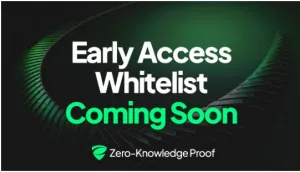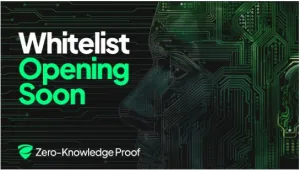
As artificial intelligence (AI) continues to push the boundaries of computation and data science, the need for efficient, transparent, and secure systems has become more apparent than ever. The increasing complexity of AI workloads and the growing emphasis on privacy have placed significant strain on traditional, centralized architectures. This context has positioned Zero Knowledge Proof (ZKP) as a promising solution, aiming to create a decentralized framework that balances compute efficiency with user data sovereignty.
The anticipation surrounding the upcoming whitelist for Zero Knowledge Proof (ZKP) reflects growing interest from both AI and blockchain communities. Designed with a dual consensus structure that integrates Proof of Intelligence (PoI) and Proof of Space (PoSp), the network offers a foundation for distributed AI compute that prioritizes fairness, scalability, and verifiable trust. As this upcoming crypto ICO enters its prelaunch phase, it has begun drawing attention as a potential next presale to explode within the evolving landscape of decentralized AI infrastructure.
A Dual Consensus Model Built for Balance
At the heart of Zero Knowledge Proof (ZKP) lies its innovative dual consensus mechanism, combining PoI and PoSp to achieve equilibrium between computation and storage. This approach enables the network to allocate resources efficiently, allowing nodes to contribute to AI computation while ensuring data reliability across decentralized systems. By dividing these responsibilities, the ecosystem reduces bottlenecks and creates a sustainable framework for scaling AI workloads.
The Proof of Intelligence component ensures that participating nodes demonstrate verifiable computational capabilities, effectively rewarding meaningful contributions to AI-driven operations. Meanwhile, Proof of Space introduces a verifiable method of storage validation, maintaining the accuracy and availability of distributed data. Together, these mechanisms address key inefficiencies in centralized infrastructure by promoting decentralized participation and measured resource contribution.

As the Zero Knowledge Proof (ZKP) whitelist prelaunch nears, the project’s emphasis on this hybrid model is becoming a focal point among investors and developers seeking structured scalability within the AI and blockchain intersection. Its dual consensus system presents a methodical response to the increasing demand for secure, efficient distributed computing within the upcoming crypto ICO environment.
Privacy as the Cornerstone of Collaboration
Data privacy has long been a limiting factor in collaborative AI development, often restricting innovation due to concerns around intellectual property and data exposure. Zero Knowledge Proof (ZKP) addresses this by integrating cryptographic methods that allow verifiable computation without revealing underlying data or proprietary algorithms. This privacy-first framework enables different parties to collaborate without compromising ownership or confidentiality.
Through zk-based cryptography, computations can occur on encrypted data while maintaining complete privacy. This structure aligns with emerging global data standards that emphasize user consent, security, and sovereignty. Within the Zero Knowledge Proof (ZKP) network, both developers and data providers are equipped with the means to engage in AI processes securely, knowing that their data remains shielded from external access.
This focus on privacy does more than protect data, it establishes the foundation for a trusted ecosystem where AI collaboration can scale. It also positions Zero Knowledge Proof (ZKP) as one of the best presale crypto projects for those following developments in privacy-preserving blockchain solutions. As the whitelist draws closer, its model continues to capture attention for addressing one of the most significant challenges in the integration of AI and decentralized systems.
Building the Framework for a Decentralized AI Marketplace
Beyond its core compute and privacy layers, Zero Knowledge Proof (ZKP) introduces a decentralized marketplace for data and AI models. This marketplace allows contributors to share, exchange, or monetize their computational and data resources while ensuring that all transactions remain secure and verifiable. By leveraging zero-knowledge-based verification, participants can maintain full control of their assets while benefiting from collective contributions to the network.
The system creates a balanced ecosystem where both large-scale organizations and individual node operators can participate equitably. The marketplace’s structure supports fair value distribution, meaning that every contribution, whether in computation or data, has measurable worth. This framework aligns with the broader goals of Decentralized Physical Infrastructure Networks (DePIN), where community-driven participation replaces centralized control.

As momentum builds around the whitelist phase, the Zero Knowledge Proof (ZKP) marketplace has become a point of interest for users seeking decentralized economic opportunities within AI. Its design highlights a shift toward verifiable and transparent compute infrastructure that still maintains the privacy users demand. For those tracking the next presale to explode, this focus on equitable participation and functional utility continues to strengthen the project’s standing in the blockchain community.
The privacy mechanisms and balanced consensus underpinning the Zero Knowledge Proof (ZKP) ecosystem also provide a stable foundation for scaling its AI operations. As distributed compute networks evolve, such systems that integrate accountability, performance, and security are likely to play a defining role in shaping next-generation AI infrastructure.
Closing Analysis
With its whitelist launch approaching, Zero Knowledge Proof (ZKP) is emerging as a focal point within the conversation on decentralized AI compute and data privacy. Its dual consensus design and zero-knowledge-based validation mechanisms bring together the core principles of blockchain trust and AI efficiency, creating a framework built for both scalability and collaboration.
While still in its prelaunch stage, the growing anticipation around Zero Knowledge Proof (ZKP) underscores the market’s appetite for solutions that prioritize privacy and verifiability. As interest in upcoming crypto ICO projects continues to expand, this initiative stands out for its combination of technical depth, utility, and commitment to equitable participation, positioning it among the best presale crypto opportunities to watch in the evolving AI and blockchain landscape.
Find Out More At:
Information contained on this page is provided by an independent third-party content provider. Binary News Network and this Site make no warranties or representations in connection therewith. If you are affiliated with this page and would like it removed please contact [email protected]



Comments